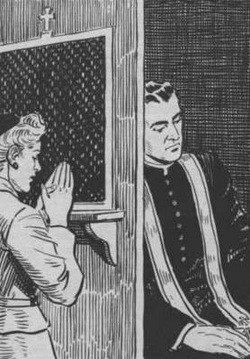Confidentiality
Confidentiality is an important part of many aspects of our lives. When we reveal our secrets, we trust that the other person will keep them. When we share private health factors with our doctor, we trust he or she will not go post it up on Facebook ("Guess what gross toe fungus Jim has?!? OMG!") When we share secrets with our priest or other religious leader, we believe that they will use that information to help us, not to spread gossip. And in the military, a high degree of confidentiality must be kept about your sexuality. Failure to keep this confidentiality can result in being discharged. In these three aspects of life, the keeping and sharing of secrets plays a huge role.
In Medicine

Confidentiality is an essential part to any patient-doctor relationship. Without this policy, people would not feel comfortable sharing private thoughts or conditions with their doctor. The purpose of confidentiality in medicine is to make the patient feel that they can share anything with the doctor, without worry that others will find out. For example, doctors will not report you to the police if you admit that you have used drugs in the past. That information could be vital to the doctor's ability to diagnose you. Without express consent from the patient, a physician cannot release their medical record. Breaches in confidentiality go against the ethics codes sponsored by the AMA (American Medical Association) and can be prosecuted in a court of law. The 1974 Federal Privacy Act restricts access to medical information and records. Confidentiality is becoming even more important with the increased use of computer databases to hold patients medical records. With this new technology, it is more difficult to control who sees patients' information. Password protection and file encryption are being used to help prevent breaches in confidentiality. There are two main cases that would give just cause to break confidentiality. The first is if the physician is afraid that the patient may hurt him/herself or anyone else. If a patient gives doctor, or psychotherapist, reason to believe that they will harm someone else, the doctor is required by law to report this. The other case is if the person has a communicable or infectious disease that could harm others. While it varies from state to state, diseases that should be reported to the state include AIDS and Class IV HIV, hepatitis A and B, measles, rabies, tetanus, and tuberculosis. Suspected cases of child, dependent adult, and elder abuse are also reportable, as are gunshot wounds. If a patient has a sexually transmitted disease (STD), the doctor may share this information with their partner and suggest that they receive screening for that disease. To see if you can decide whether or not to share a patient's information in three different cases click here. To see our interview with Deborah Hoffman, a social worker who deals with confidentiality everyday, click here.
In Military

The "Don't Ask, Don't Tell" law was passed by Congress in 1993. This law allows for the discharge of openly gay,lesbian, or bisexual service men and women. Since it has been put into place, the law has caused the discharge of over 14,000 men and women. Bans on gays in the military have been in place for the last fifty years, this law is different for a few reasons. First, it admitted that homosexuals serve honorably in the military. Second, it allows homosexuals to serve in the military as long as they do not show their homosexuality in anyway. While this ended the hunts to root out gays in the military through harsh investigations, it is still oppressive. It is illegal in any other field of employment to fire someone based on sexual orientation. Military personnel can be fired on even the smallest show of their homosexuality, such as holding hands with someone of the same sex. The law forces service men and women to hide who they are and can put a block up in building relationships with their co-workers. In a CNN survey, 72 percent of people polled wanted the repeal of DADT. Another survey showed that 58 percent of conservatives want to repeal the law. When asked about serving in a unit with a gay co-worker, the Pentagon’s
Comprehensive Review Working Group (CRWG) reported that 92 percent of
service members believe the unit’s “ability to work together” was “very
good,” “good,” or “neither good nor poor.” The report also revealed that younger members of the military do not care about their coworkers sexuality and do not believe that it affects their job performance. On December 22, 2010 President Obama signed a bill to repeal DADT.
However, the repeal has not been certified and remains in effect until
60 days after its certification. The video below tells the story of Dan Choi, a gay man in the military. It was told at a Moth presentation. The Moth is an organization that sets up forums for people to share their life stories, from heart wrenching to on the floor laughing hysterical. The one below shows how a real individual was affected by the "Don't Ask, Don't Tell" policy. To see more Moth stories, or to subscribe to their podcast click here.
In Religion

The relationship between a spiritual leader, such as a priest or rabbi, and follower can be similar to that of doctor and patient. In order to help a person "get better" and give spiritual guidance, a priest or other religious figure must maintain a certain degree of confidentiality. People confide in their religious leaders with the trust that their issues will be handled with discretion. Similar to the patient-doctor relationship, a patient/religious follower will not feel comfortable in sharing their problems if they are not confident that their secrets will be kept. In the Roman Catholic Church, the sacrament of confession is held to a very high degree of confidentiality. Under no circumstances can a priest share what they have learned in confession with anyone. Abuse, adultery, and even homicide must go unreported if the priest wishes to remain a member of the clergy. This is to insure the spiritual health of the person, as the Catholic religion teaches that God will forgive all that is repented in the sacrament of confession. However, what about the other conversations held with a priest or pastor? Some people believe that all conversations should be considered private and confidential. Generally, conversations that take place in a private setting, where there is no risk of others overhearing, are considered confidential. If the purpose behind the meeting is so that the person can confess their sins and receive absolution, it is strictly confidential. However, if the information is revealed in a less formal way, it is really up to the pastor whether or not to divulge the information to authorities. It is recommended that priests or other religious leaders warn their church members that they will report anything that could potentially cause harm to another person before continuing a conversation with them. The degree of confidentiality within a religious community is not easily definable or set, and this may cause uncertainties in the community.
Sources
Images:
Images:
- Patient Confidentiality: It’s Everybody’s Job, Not Everybody’s Business - DVD. Photograph. Bussiness Training Media Inc. Web. 18 Apr. 2011. <http://www.business-marketing.com/store/healthcarerights.html>.
- Repealing "Don't Ask, Don't Tell" Goes Grassroots. Photograph. The Bilerico Project. By Waymon Hudson. 26 July 2009. Web. 18 Apr. 2011. <http://www.bilerico.com/2009/07/repealing_dont_ask_dont_tell_goes_grassroots.php>.
- Culture Confessional. Photograph. MamaPop. 5 Aug. 2009. Web. 18 Apr. 2011. <http://www.mamapop.com/2009/08/mamapop-pop-culture-confessional-backpacking-dad-edition.html>.
- Edwards, Kelly A. "Confidentiality: Ethical Topic in Medicine." Ethics in Medicine. Univeristy of Washington School of Medicine, 11 Apr. 2008. Web. 17 Apr. 2011. <http://depts.washington.edu/bioethx/topics/confiden.html>.
- "Patient Confidentiality." American Medical Association - Physicians, Medical Students & Patients (AMA). Web. 17 Apr. 2011. <http://www.ama-assn.org/ama/pub/physician-resources/legal-topics/patient-physician-relationship-topics/patient-confidentiality.page>.
- "What Is “Don’t Ask, Don’t Tell, Don’t Pursue, Don’t Harass?”." Servicemembers Legal Defense Network. Web. 18 Apr. 2011. <http://www.sldn.org/pages/what-is-dont-ask-dont-tell-dont-pursue-dont-harass>.
- "Next Steps for “Don’t Ask, Don’t Tell” Repeal." Servicemembers Legal Defense Network. Web. 18 Apr. 2011. <http://www.sldn.org/pages/next-steps-for-dont-ask-dont-tell-repeal>.
- Audette, D. Elizabeth. "Confidentiality in the Church: What the Pastor Knows and Tells." Christian Century 28 Jan. 1998: 80-85. Religion Online. Web. 18 Apr. 2011. <http://www.religion-online.org/showarticle.asp?title=317>.
- YouTube - The Moth Presents Lt. Dan Choi: Don't Tell, Martha! Prod. The Moth. Perf. Lt. Dan Choi. YouTube- Broadcast Yourself. 30 Nov. 2010. Web. 18 Apr. 2011. <http://www.youtube.com/watch?v=iBpweLRwrjc>.
